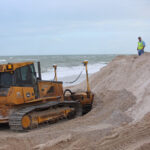INDIAN RIVER COUNTY – The Board of County Commissioners unanimously supported asking Gov. Charlie Crist for help in resolving issues related to bad Chinese drywall in Indian River County.
Commissioners approved a resolution asking the state’s leader to “activate all available state and local emergency and relief resources and mechanisms for the benefit” of impacted homeowners. County Commission District 2 candidate Carolyn Corum addressed the commission’s request, asking that the county be sure that they pursue state and federal assistance instead of allocating local funds for what she estimates would be $100,000 per affected home.
Commissioners toured homes in the Antilles community last year that homeowners say was constructed with tainted drywall that has caused damage to wiring and metals and created health issues.
Local officials and state representatives have expressed frustration that there is as of yet no process in place for homeowners to seek relief – for replacing the drywall or replacing the damaged wiring and metal items.
According to the U.S. Consumer Product Safety Commission, the following are indicators that your home might have Chinese drywall:
Drywall is newer than 2001
A “rotten egg” smell within house
The backside of this drywall (not normally visible to the resident) is labeled as “MADE IN CHINA.”
The ground wire connected to the green screw is blackened and corroded. This wire should be copper-colored.
Bathroom and other such fixtures are pitted and corroded
Copper coils on the air conditioner unit are blackened and corroded
Copper pipes are blackened
The U.S. Consumer Product Safety Commission suggests you do the following if you suspect Chinese drywall in your home:
The most important issue is your health and safety. If you are suffering from the health symptoms described as common to the reports of exposure to problem drywall, please consult your physician as soon as possible.
If you experience any of the electrical or fire safety concerns described as common to the reports of exposure to problem drywall, please consult your local gas or electric supplier and a licensed electrician or building inspector as soon as possible.
You should contact your State and local authorities to report your concerns and get direction on any help or resources in your area.
You should also report your concerns to the US CPS Commission using the form at www.cpsc.gov
You should also consider contacting your insurance company and homebuilder to report your concerns.
You should generally watch for the following potential electrical hazards in your home:
Arcs/sparks – bright flashes or showers of sparks anywhere in your electrical system.
Sizzles/buzzes – unusual sounds from electrical system devices.
Electrical shocks – any shock, even a mild tingle.
Multiple symptoms would be a stronger indication of problems.






